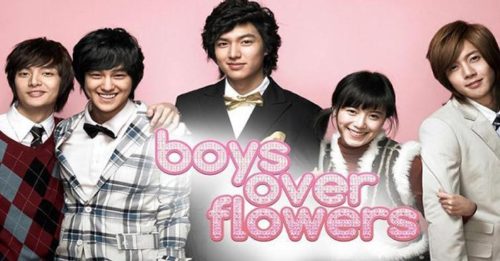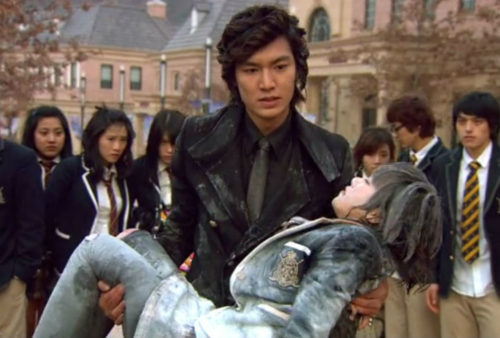K-drama review: Boys Over Flowers

Yes, after almost a month of no book reviews because, well, brain mush, I bring you an extra-long review – of a TV show. Because why not?
This review is of the Korean version of Boys Over Flowers from 2009. It’s based on a long-running Japanese manga called Hana Yori Dango and there have also been Japanese, Taiwanese and Chinese TV series, but this is the one that popped up on Netflix earlier this year and caught my eye, and it’s the one I watched obsessively for the last few weeks – all 25 hours of it.
I should open with the fact that this is a ridiculous, OTT, not-to-be-taken-seriously show. It has a hyper-real quality and is more about glamour than any of the issues it covers. But I was hooked and thoroughly entertained. I think part of the reason I enjoyed it is that it is easy on the brain. And the subtitles meant that I couldn’t multi-task, which is just as well when you have mush for brain.
It was a little odd to watch something where I knew zero words of the language beforehand, and it was probably a good 10 hour-long episodes in before I started to pick up on some of the basic words and further in than that before I began to catch instances where the subtitles weren’t quite what was being said, so there’s a strong chance I missed some nuance early on. That said, this is not a nuanced TV show.
It opens with a student at an elite private high school being bullied so badly that he is on the verge of a suicide attempt. Our heroine, Geum Jan-di, shows up just in time with a dry-cleaning delivery and talks the victim down. To counter the bad press around the incident, Jan-di is offered a scholarship to the school. As the only working-class pupil she is bullied from the start. When she stands up to the F4 – a gang of four of the richest young men in Korea who set the tone for the cruel bullying that the whole school engages in – they make things even harder for her, and she in turn resists in a clumsy, sometimes crude, always feisty manner that is in stark contrast to the F4’s ultra-smooth sophistication.
The F4 attract rock-star-level hype wherever they go (appropriately two of them are played by K-pop stars). Their leader, Gu Jun-pyo, is heir to one of Korea’s biggest corporations. He is played by Lee Min-ho, who for me was the standout actor (not that the competition was fierce). Though Jun-pyo is basically an awful human being for 90% of the show, Lee Min-ho does a great job of showing his sweet and vulnerable sides. He’s also the character that gets the most development, so I guess he had good material to work with.
The next member of F4 is Yoon Ji-hoo, who lost his parents when young and consoles himself in music. He doesn’t really take part in the bullying, though he also doesn’t condemn it. He is played by probably the weakest actor of the five leads, Kim Hyun-joong, who pretty much just pouts and tries painfully hard to look soulful. From my limited knowledge, I think Ji-hoo is supposed to epitomise the Korean “flower boy” hinted at in the show’s title: artistic, delicate, deeply feeling, but also a fighter when needed (sidenote: one thing I like about this show is that almost all of the male characters are shown crying when they’re upset, often, and I don’t think it’s intended as a big deal). All of F4 are attractive and complete dandies, but Ji-hoo definitely has the sensitive artist thing too.
The other two members of F4, who are lumped together for much of the first half of the series, are So Yi-jung – an internationally celebrated ceramic artist and womaniser, played by Kim Bum, the prettiest of these pretty boys – and Song Woo-bin, heir to a construction business with shady undertones, played by Kim Joon and the least developed of the F4 over the series. There are lots of other characters, many of whom are key from start to finish, but these five are the ones plastered over the opening credits and promo posters.
In an unlikely turn from the horrific bullying they mete out, Jan-di, Jun-pyo and Ji-hoo end up in a love triangle for most of the series. Other romantic partners come and go, but the bulk of the storyline is about which boy Jan-di will end up with. She makes a huge impression on all of F4, who go from her tormentors to her protectors when it turns out that the real bully of the show is Jun-pyo’s mother, who has the money and power to do some pretty horrific things to Jan-di and her family to keep her away from her son.
The events of the story are outrageously ridiculous, with multiple kidnappings, near drownings and other near death experiences. Not to mention the incidents of being drugged, conned and very possibly sexually assaulted that are far too quickly forgotten. But with multiple major events in every hour-long episode, you just cannot take it seriously. It’s also unbelievably chaste – particularly considering the number of times young people who are romantically linked stay over at each other’s houses or go on dates. There are maybe a dozen kisses in the entire show, all of them closed-mouth lip presses that in no way resemble actual kissing but are turned into huge slow-mo extravaganzas.

This is not a subtle show. Every moment of heightened emotion is heavily telegraphed. There are three or four K-pop songs that are played repeatedly, becoming the theme songs for certain storylines. There are so many cheesy flashback montages that by the final six episodes I was fast-forwarding them. And the mode-switches can be a little strange. The first episode covers bullying with appropriately serious tone, then switches to Jan-di’s home life with a comedic edge that borders on offensive to the working class.
Certainly, it is a show that worships money – with glamorous locations, high fashion and opulent homes – while selling a storyline about money not being what’s important in life. It’s one of the show’s problems that it is trying to sell the idea that Jan-di will marry one of these billionaires as the only desirable outcome, and while it gets much better at depicting Jan-di’s working class family and friends, they definitely get edged out in importance by the F4 and their families.
So why did I enjoy it at all? I think the level of ridiculousness (not to mention the mostly hammy acting) gives it a fairytale/pantomime quality that largely allowed me to forgive the terrible message it was sending to its primarily tween audience. In the moment, at least. I would not recommend this to an impressionable young person, but for an adult who already knows how real-life people should treat each other, it’s (hopefully) harmless fun. And bizarrely addictive.
This spoiler-tastic review does a really good job of explaining the show’s pros and cons. The comparison to Pride and Prejudice is apt – this story has pride, prejudice, romance and economic disparity in abundance, and Jun-pyo is not unlike Mr Darcy in his arrogance and conversational style. Another classic you could compare this to (and I guess this does constitute a spoiler) is The Taming of the Shrew. Jan-di is gradually worn down from spirited resistance to meek gratitude, and that is without a doubt the aspect of the series I liked the least. One of the things I initially liked about the show was that Jan-di stood up for herself and showed pride in her roots. But then it descends into endless situations from which Jan-di must be rescued – usually, for contorted reasons, by Ji-hoo. She is constantly saying thank you for being saved from problems created by the rich characters.
And yet, all the show’s manipulations worked on me and I liked the way it ended (though not so much the majority of the plot of the final two episodes). I felt satisfied by how it wrapped up, mostly because it had been written so no other ending could work. The more I reflect on it the more I see its problems, but I am also seriously tempted to check out other TV series of this ilk. Any recommendations?
I’ll add that if you kinda like the sound of this, fellow book blogger Suey has reviewed a whole bunch of K-dramas and has made me want to watch them all!
http://sueysbooks.blogspot.com/p/kdrama-reviews.html
I just finished watching the entire season for the first time. I live in US and never heard of show. I am also a great grandmother who I think has lost her senses. I have sat here crying day after day wishing it was me in the series and I was Jundi. I am in love with Ji hoo . I am acting as I did over heart throbs and joining fan clubs back in my day. I thoroughly enjoyed and have watched it more than a few times. Wish I had a Cd of his music even though I don’t understand the language ..
I was in complete thrall to this series when I watched it. I would stay up late and wake up early to squeeze in another episode. I had never been so addicted to a TV show before.
I gotta recc The Legend of the Blue Sea, with Lee Min Ho (Goo Jun Pyo), it’s so well done! It’s more recent than Boys Over Flowers, and many people might steer you toward Heirs instead, but Legend of the Blue Sea (streaming on Hulu and Viki) is top notch addictive entertainment. Full stop.
Oh I agree Legend of the Blue Sea is way better than Heirs. I enjoyed it a lot: https://www.noseinabook.co.uk/2019/04/27/k-drama-review-legend-of-the-blue-sea/